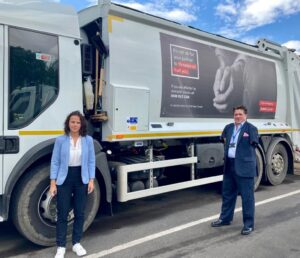A visual campaign has launched signposting people to support if they are experiencing domestic abuse.

Dorset Council’s vehicle banners advise anyone experiencing difficulty in their relationship that confidential advice and help is always available.
They can either telephone the You First domestic abuse helpline on 0800 032 5204*, 24 hours a day, search online for ‘DVA help Dorset’ or visit the website for contact details. In an emergency, always call 999.
*calls are free but the number may show up on some itemised phone bills.
The banners are displayed on the council’s vehicles, including waste and recycling trucks and mini buses. They remind people that:
- Controlling behaviour is domestic abuse
- It’s not okay for your partner to threaten or hurt you, and
- You should be treated with respect
Councillor Graham Carr-Jones, Portfolio Holder for Housing and Community Safety, said: “The aim of the campaign is to let Dorset residents struggling at home know that support is always available, and how to access it.
“If you are finding family life difficult, please reach out. Our partners at You First are there for you, whatever your age and no matter what time of day it is.”
You First are the council’s domestic abuse support partners. They work with men, women and children to reduce harm and increase safety. Their specialist team offers community and accommodation-based services and give expert advice, information, and emotional support to ensure safety and build the confidence to move on.
Tonia Redvers, Operations Director at You First said “These banners are wonderful. They help get information out into the heart of our communities, where people can take a discreet picture of the number, use it for themselves or pass on to a family member or friend, where safe to do so. Please know that even though you may feel alone, we are there to help and support, please phone when you can”.
Councillor Molly Rennie, Dorset Councillor who leads on domestic abuse work, said: “Over the past eighteen months, our relationships have been hugely important. However, for some people, sadly, home has not been the safest place.
“If you are feeling unsafe or frightened because someone in your home is hurting you, either physically or mentally, it’s not your fault. Confidential advice and support is always there for you, whatever your age or gender.”
Councillor Carr-Jones continued: “Dorset Council, working with its partners, is committed to tackling domestic abuse in all its forms. This includes preventing it, supporting people experiencing domestic abuse and prosecuting offenders. Domestic abuse is unacceptable, and the new laws will strengthen the local response, providing adults and children with the right support at the right time.”
The campaign coincides with the Domestic Abuse Act 2021 which became law in April 2021. The Act aims to promote awareness, protect and support people experiencing domestic abuse, transform the justice response and improve performance.
As part of the new Act, the council is set to receive an additional £650,000 from the government to fund a new duty providing support for victims and their children, including safe accommodation.
David Sidwick, Police and Crime Commissioner for Dorset, said: “Domestic abuse is a toxic and destructive crime which all too often remains hidden. I’m absolutely committed to putting victims at the heart of my plans for making Dorset the safest part of the country, and that involves working closely with Dorset Council and their partners as well as with the police.
“I want people who are experiencing domestic abuse to know they are not alone and support is out there for them. Please – if you’re having difficulties or being threatened by someone you’re in a relationship with – phone the number on these banners and talk to someone who can help.”
Chief Inspector Julie Howe, Dorset Police lead for The Force Vulnerability Programme, said: “We understand that victims may not wish to contact the police in the first instance, and applaud initiatives like this which highlight partner agencies and the support they can provide.
“By the same token, if anyone is in immediate danger they should call 999, and can use any of our non-emergency contact options if they feel they are being subjected to abuse. Domestic abuse takes many forms and can happen to anyone. We will listen, we will support you, and we will safeguard you.”

